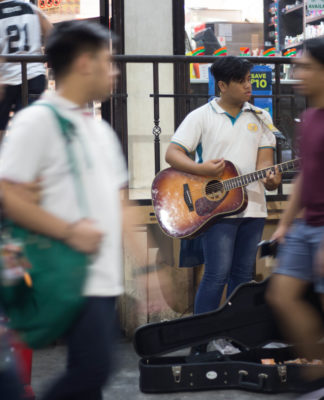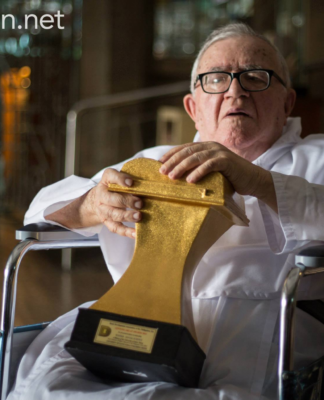 IT’S NO longer surprising to ride a jeepney and find a couple of people—children, adults, or a combination of both—trailing behind you. They wear mismatched clothes, smell like they haven’t bathed in days, and carry with them milk formula cans made into drums and tattered white envelopes. Over passengers’ laps or bags, they place these envelopes, which state in grade school handwriting that either they belong to an ethnic group or that they need money for food. If you’re lucky, you might get to listen to a song you can’t understand at all. Then, they collect their envelopes and get off the vehicle. No “thanks” or a smile if you give, and a big frown and slurred, unrecognizable words if you don’t. I remember only one of them, a man, who smiled and made a small nod upon receiving meager alms.
IT’S NO longer surprising to ride a jeepney and find a couple of people—children, adults, or a combination of both—trailing behind you. They wear mismatched clothes, smell like they haven’t bathed in days, and carry with them milk formula cans made into drums and tattered white envelopes. Over passengers’ laps or bags, they place these envelopes, which state in grade school handwriting that either they belong to an ethnic group or that they need money for food. If you’re lucky, you might get to listen to a song you can’t understand at all. Then, they collect their envelopes and get off the vehicle. No “thanks” or a smile if you give, and a big frown and slurred, unrecognizable words if you don’t. I remember only one of them, a man, who smiled and made a small nod upon receiving meager alms.
They’ve joined the jeepney alms business, formerly dominated by street-sustained children who have gone from wiping people’s shoes to tunelessly singing Parokya ni Edgar’s “Gitara”.
It’s during times like this when the jeepney would fall into an awkward silence with doubtful or couldn’t-care-less glances. What I would do is sit as far from them as I can and hope that they wouldn’t bug me. But there’s no escape. Even when one settles for the jeepney entrance, the other would walk around and ask for money. They’ve also sat beside me a couple of times, pushing their empty, ragged envelopes on top of my bag.
Out of fear of being put on the spot, or perhaps just that nagging sense of giving, I usually fish out a five-peso coin and hand it over (except when I don’t have enough, of course). I would catch other passengers looking at me like it’s a social offense to do this.
This would cross my mind often. Am I contributing to a wrong cause? Am I being stupid? I never get the answers. The only thing I can think of saying is that I’d like to give these beggars the benefit of the doubt.
Maybe it’s their unfortunate lives that have stolen their smiles and their sense of gratitude. Maybe they’re too focused on making it through the day with coins. Maybe it’s that very little shred of pride that’s left of them. Or maybe they’ve just given up on trying because people treat them with discriminating and apathetic glances. That probably is how they think they can really survive.
Perhaps they’re just like some of us, who forget to say thanks for even the simplest blessings that come our way. We have a lot of reasons—“so much to do, so little time,” “good but not enough,” and “this is not what I wanted,” among others. Maybe this life is not supposed to satisfy us fully. Maybe it would be wrong for whatever it is we believe in to give in to our every beck and call. Maybe contentment is just a state of mind, and most probably, we have to make the most of the hand we are dealt with.
But we don’t have time to realize this. We just keep on moving along with waves of gladness and heartbreaks. It’s a case of survival as well.
Now, whenever I remember these beggars, John Lennon starts to sing “Imagine” in my head. In this song, he says, “You may say I’m a dreamer/but I’m not the only one.” I still hope that our society—that our bond as persons—will get better. I may be wrong, but it’s the only way I can deal with all the negative vibes around. But the sad part is that, while John and I are not the only ones, there still seems to be few of us around.
















